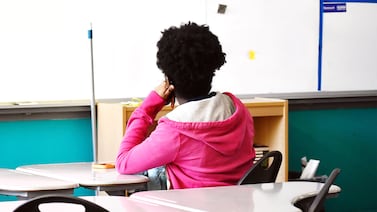After more than a year of heated debate, the Illinois state board of education has decided not to move forward with proposed changes to the state’s existing standardized test, saying it will reconsider changing the end-of-year exam once schools return to normalcy after the pandemic.
The state board of education announced last April that it was looking at changing the state’s current assessment system. After the coronavirus pandemic interrupted schools across the state, the board considered changing the assessment to collect data on how much learning students lost over the last two school years.
The original proposal called for a gradual replacement of the Illinois Assessment of Readiness exam, or the end-of-year assessment, by 2025 — when the state’s contract with Pearson, the creators of the IAR, ends. With both contracts potentially overlapping, the state board of education expected 20% of the state’s student population to take both exams.
Under that proposal, the state would have contracted a company for almost $300 million over five years to create an assessment that would test Illinois students in third through eighth grade three times a year. The state also wanted to administer an optional test for students in kindergarten through second grade.
At the state board’s May board meeting on Wednesday, state superintendent Carmen Ayala said the state board decided to hold off considering changes because many schools are still rebounding from the toll that the pandemic has taken on learning in classrooms.
The state board will “continue our focus in supporting students’ academic and social emotional recovery from the pandemic and working toward closing any equity gaps for our students,” Ayala said.
After board member Donna Leak asked Ayala what the state board could do to speed up reporting assessment results to school districts, Ayala said she will work with the state’s current vendor to report results to school districts faster. School district leaders, administrators, and educators have said it takes too long for districts to get assessment results.
Leak also asked if the state board could limit the number of tests administered during the school year. Ayala said interim assessments are administered by local school districts, not the state. A majority of the state’s 852 districts use interim assessments. Chicago used the Measure of Progress assessment until the district ended its contract with NWEA — the administrator of MAP— last year.
Roger Eddy, along with other board members, applauded Ayala for getting feedback from school districts and educators on how to improve the state system and said they hope to use that feedback in the future.
“If we were to prioritize all the comments and feedback that we received, you’d hit the nail on the head for what I think most educators would like from their assessment system, which would be more timely results,” said Eddy.
The state board’s decision to table changes to assessments came a week after Gov. J.B. Pritzker signed the “Too Young To Test” bill last week. The new law will prevent the state board of education from requiring standardized assessments for students in kindergarten to second grade unless for diagnostic or screening purposes. The bill was advocated for by Illinois Families for Public Schools and other advocacy groups who were concerned about testing early learners.
School leaders, educators, and advocates were not satisfied with the state’s current end-of-year assessment because results are reported the next school year and testing takes time away from curriculum.
Many were also concerned about increasing the number of tests given every year. Some spoke about what they would like to see in any new state assessment system during the public portion of the meeting on Wednesday morning.
Cynthia Riseman Lund, legislative director of the Illinois Federation of Teachers, said too much time is being taken away from learning in the classroom due to the amount of testing in schools.
“In too many school districts across Illinois — especially in school districts with higher community poverty rates who serve black and brown students — our members decry the overuse and misuse of these types of interim tests,” said Riseman Lund. “When districts purchase interim tests to prepare for the summative state tests, the results are harmful to students’ work and to teaching and learning.”
John Burkey, president of the Illinois’ Large Unit District Association, said assessments are important, but they need to be better. Burkey also advocated for the board to support districts to purchase or develop interim assessments so “they can get quality student assessment on individual students.”
Samantha Smylie is the state education reporter for Chalkbeat Chicago, covering school districts across the state, legislation, special education, and the state board of education. Contact Samantha at ssmylie@chalkbeat.org.







